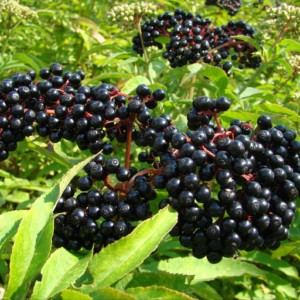By: Dr. Natalie Ledbetter CRNA, DAcOM
Elderberry (most commonly Sambucus nigra, also known as European elderberry or black elderberry) has many health promoting properties. In Chinese medicine it is known by the pinyan name, Jie Gu Mu.
Elderberry has been used for centuries in various traditional medicines as a home remedy to promote health and vitality and strengthen immune function. Teas and syrups made from the elderberry plant have been commonly used to fight upper respiratory infections.
A 2004 study found that one tablespoon of elderberry syrup four times a day for five days eases the symptoms of flu four days sooner than placebo. A 2019 study showed that elderberry protects agai nst viral attacks by preventing the virus from entering cells. It also inhibits replication of the virus in cells that do become infected. Yet another study tested its effectiveness in air travelers. Those who took elderberry syrup had a shorter duration of cold symptoms that were less severe than those in the control group.
nst viral attacks by preventing the virus from entering cells. It also inhibits replication of the virus in cells that do become infected. Yet another study tested its effectiveness in air travelers. Those who took elderberry syrup had a shorter duration of cold symptoms that were less severe than those in the control group.
Elderberry has higher levels of anti-oxidants then even vitamin C. Elderberries contain zinc, vitamin E, vitamin C, and anthocyanins. Anthocyanins are a type of flavonoid, a class of compounds with antioxidant effects. Found naturally in several foods, anthocyanins are the pigments that give red, purple, and blue plants their rich coloring. Anthocyanins have a wide range of health benefits that will be discussed in an article to be published soon.
Elderberry has been shown to promote the release of certain helpful cytokines which allow for a more efficient immune response. Elderberry extract has been proven to decrease upper respiratory symptoms and to decrease overall inflammation in the body. Detoxification processes are promoted by elderberry supplementation. This gift from nature can even soothe sunburn and injuries such as sprain and strain when used topically.
When wild harvesting or cultivating elderberries, it is important to use only the blue, dark purple, or black berries and to cook them because the raw berries contain a cyanide producing chemical. Unripe elderberries are toxic even when cooked and should never be consumed.
This berry and syrups, teas, and tinctures made from this berry have been shown in scientific studies to support the immune system and to be particularly useful in combatting the symptoms of upper respiratory tract infections. Many over the counter formulations are available.
